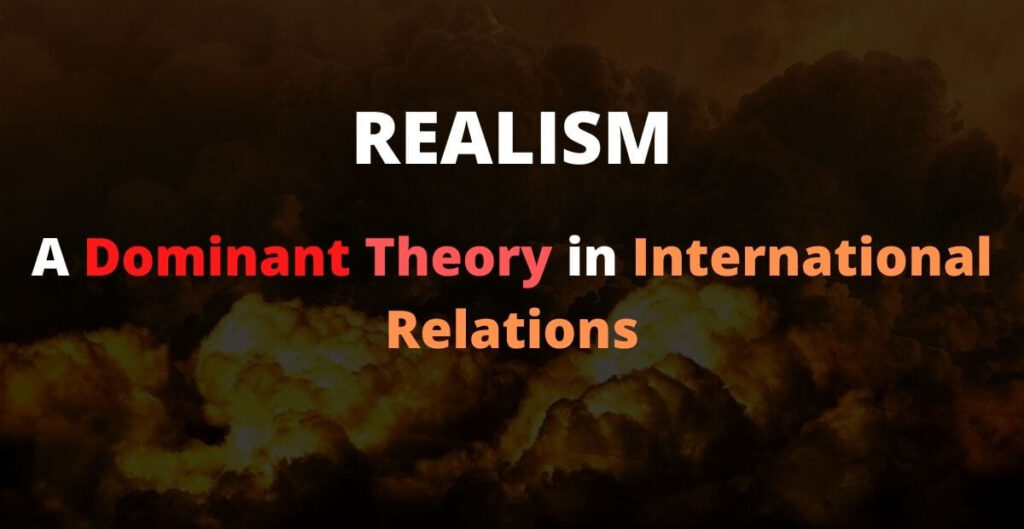Realism in international relations is the most dominant school of thought after World War II and until now it has relevance in the present international politics.
Realism gained its popularity in the late 1930s and early 1940s when the idealist approach failed to analyze real politics throughout the world. The center points of realism are State, Power, and Self-Interest.
The basic outlines of Realism In International Relations
The basic outlines of Realism are –
- International politics are anarchic.
- A sovereign state is a principal actor in international politics.
- The state is a rational unitary actor which acts under the consideration of its own national interest
- National security and Survival are the primary goals of the State.
- National Power and capabilities determined the relations among states.
Must Read– Meaning, Nature, And Scope Of International Relations
Origin of Realism in International Relations
Though Realism theory in International relations emerged after the 1930s, the concept of realism has its own ancient tradition. We find the concept of realism in the writings of several political thinkers such as-
- Thucydides (460BC-406BC),
- Niccolo Mechiavelli, (1469-1527),
- Thomas Hobbes (1588-1679) and
- Jean-Jacques Rousseau (1712-1778)
- Chanakya’ (370BC-283BC)
Thucydides (460BC-406BC)
Thucydides was an ancient Greek historian who wrote the ‘History of the Peloponnesian War’. In this book, he described the intellectual forerunner of realpolitik. Realpolitik refers to the political realists’ perspective of looking at world politics, especially from the viewpoint of human nature.
This war was originally between Athens and Sparta. By profession, he was a military of Athens and this book was the participant’s observer’s diary. In exploring the cause of this war, he shows how Athens’s ability to grow and the lack of a sense of Spartan security led to a totalitarian movement throughout Greece.
The main part of this war was ‘The Melian Dialogue’. When Athens attacked Melos and proposed to surrender but the council of Melos refused it and said that “…we invite you to allow us to be friends of yours and enemies to neither side, to make a treaty which shall be agreeable to both you and us, and so to leave out country”.
It was an attempt to preserve self-esteem. Naturally, Athens destroyed the Melos and establishes itself. The policy of Athens was that “ the standard of justice depends on the equality of power to compel and that in fact the strong do what they have the power to do the weak accept what they accept”. It was also a method of establishing the dominance of a powerful state.
Niccolo Mechiavelli (1469-1527)
Niccolo Machiavelli, an Italian philosopher wrote a famous book called “The Prince”. This book was also considered as a guidebook told that what a prince should actually be and the ways he should wield his power in order to gain and maintain his sway over his state.
He said in his book that “ …a Prince, and especially a new prince, cannot observe all these things which are considered good in men, being often obliged, in order to maintain the state, to act against faith, against charity, against humanity, and against religion.”
That means The Prince of State can rise in the interest of the state in humanitarian rituals and make immoral decisions if necessary. The Prince’s main task is the protection of the state’s interests and in pursuing that purpose, the Prince can refute the principles adopted in his life.
Thomas Hobbes (1588-1679)
However, the support of political realities is most likely to be found in the book ‘Leviathan’ by Thomas Hobbes. Following Hobbes’s statement, ideas of unending and perpetual anarchy in the state of nature and the endless struggle for survival have brought in international relations.
The main cause of this anarchy and endless struggle in the state of nature lies in the basic characteristics of human nature. The man in the Hobbesian state of nature was the man to be the enemy of every man for three principal causes. These are Competition, Diffidence, and Glory. ‘The life of man was solitary, poor, nasty, brutish and short’.
Jean-Jacques Rousseau (1712-1778)
The fact that Jean-Jacques Rousseau speaks of the state’s role in describing the international situation in his ‘The State of War‘ article is largely in line with the realist statements of recent times. He said that “…it (the state) can always grow bigger; it feels weak so long as there are others stronger than itself. It’s safety and preservation demand that it makes itself stronger than its neighbors. It cannot increase, foster, or exercise its strength except at their expense, and even if has no need to seek for provisions beyond its borders, it searches ceaselessly for new members to give itself a more unshakable position.”
Chanakya’ (370BC-283BC)
Indian writer Chanakya’s ‘Arthashastra’ is a great example for discussion of the principles of statecraft, written in Sanskrit which means ‘the Science of Material Gain’ or ‘Science of Polity’. In fact, in this book of Chanakya, a broader section discusses foreign policy, defense, and war issues.
According to him, the main goal of the king in terms of policy would be to increase the power of the state, expand the empire, and destroy the enemy. In addition, Chanakya’s advice is that peace is much more desirable than war and the king will behave properly in victory or defeat. “One should neither submit spinelessly nor sacrifice oneself in foolhardy valor. It is better to adopt such policies as would enable one to survive and live to fight another day”.
Classical Realism
E.H Carr and Hans J. Morgenthau are the inventors of classical realism in international relations.
E.H Carr
E.H Carr’s famous book ‘The Twenty Years Crisis (1939) lays the foundation for this theory. However, the book is more a criticism of contemporary idealism than a discussion of the theory of international relations.
According to him, idealists are more influenced by dreams neither than thought nor by standardization than observation. According to him, political realism will be established through a critique perspective and will look at real events as a result of their causality and consequence. Idealists are berth in the role of power in the international field and identify power as the root cause of conflict.
The ideals that these thinkers say, such as the end of the war through collective security, and the management of foreign policy through the consent of the people instead of diplomacy, are all but attempts to protect the interests of the winning group.
He also thinks that in the case of inconsistent politics, the powerful groups themselves talk about maintaining peace and domination, just as the governing groups maintain peace, just as in the international field, the powerful states talk about maintaining peace. Any state should increase its national strength and resist the power of the powerful state through the balance of power.
Hans J. Morgenthau
Hans J. Morgenthau’s ‘ Politics among Nations: The Struggle for Power and Peace’ is the finest book in the classical realist theory. He believes that the science of international relations will be made through the tradition of real-life events and by the proper application of meaningful law.
According to him, the theory will be realistic, independent, insightful, and consistent with empirical reality.
He gives six principles of political realism. These are-
- Politics is governed by objective laws which have their root in human nature.
- The key to understanding international politics is the concept of interest defined in terms of power.
- The forms and nature of state power will vary in time, place, and context but the concept of interest remains consistent.
- Universal moral principles do not guide state behavior, although this does not rule out an awareness of the moral significance of political action.
- Moral aspirations are specific to a particular nation; there is no universally agreed set of moral principles.
- The political sphere is autonomous, meaning that the key question in international politics is ‘How does this policy affect the power of the nation?’
Neo-Realism
Neoliberalism was created to overcome the criticism that began in the realism discourse, due to its failure to acknowledge the importance of economics in international relations and the changing role of the establishment of different nonstate actors or establishments in the context of changing economics.
Kenneth Waltz
In the late 1970s, this theory gains its importance. Kenneth Waltz in his ‘Theory of International Politics‘ (1979) states the basic idea of this theory. According to him, the main theories of conventional international relations, whether it be system theory or Marxist theory, are mainly theories.
These theories explain international relations in some element or combination of them. But they have never been able to explain international relations through structure. There are mainly two objectives of neo-realism.
- Firstly, interpreting the discussion of state-based international relations through a structure.
- Secondly, try to explain the tendency to interpret international relations through political and military relations, political realism, and economic tradition.
- According to Waltz, there are three key elements of neo-realism
- The ordering principles of the system.
- The character of the units in the system
- The distribution of the capabilities of the units in the system.
He further noted that the main constitutive principle of international affairs is anarchy and the absence of international authority. The main goal of all states is to increase their power through self-defense and military development.
Basic Assumptions of Realism
From the above discussion, we can say that the entire realist focuses on the three key areas which also can be considered as three basic assumptions of realism in international relations. These are-
Statism
According to realism, the state is the main actor and sovereignty is the distinguishing character of the state. The prime goal of a state is to assure its security.
In the domestic sphere, the problem of order and security can be solved. But outside of the state, in the international sphere among independent sovereign states, insecurity, danger, and threats continuously exist. To them, in anarchy, every state competes with other states for power and security.
Survival
In this anarchy, the pre-eminent goal of every state is survival. Increasing power and assure security is the goal of a state but survival is the precondition to attaining this goal. According to defensive realist Waltz, security is the principal interest of the state, therefore they seek to increase their power for their survival. To offensive realist Mearsheimer, the ultimate goal of a state is to establish a hegemonic position in the international system. That means the state always desires more power to sustain its security.
Self-Help
In the international system, there is an absence of central authority to counter the use of force by one state to another state. Security is always being realized through self-help so the possibility of war is always. Waltz rightly said that ‘ self-help is necessarily the principle of action’.
Conclusion
From the above discussion about Realism In International Relations, it can be concluded that the main key areas of realism are the Power and capabilities of the state, National Interest, seeking security for survival in international anarchy, and the state being the unitary actor in international politics.
Recommended book
References
- Goldstein, Joshua S., International Relations, Pearson Education, New Delhi, 2006.
- Jackson, Robert and George Sorensen, Introduction to International Relations-Theories and Approaches, Oxford University Press, London, 1999.
- Ghosh, Peu. International Relations. Prentice-Hall of India, 2016.
- Owens, Baylis, and Smith. The Globalization of World Politics – An Introduction to International Relations. Oxford HED, 2017.



Comments are closed.